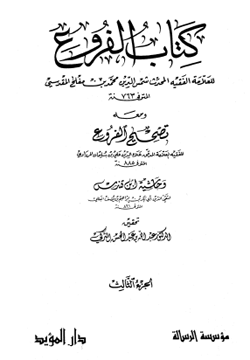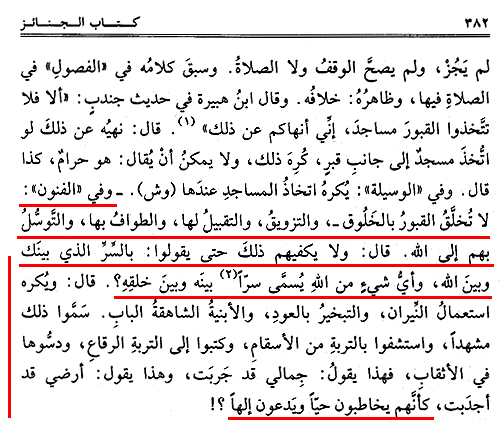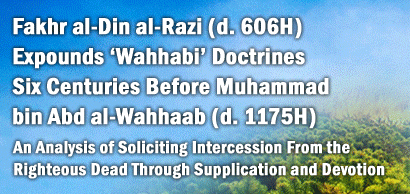 |
You are here:
Home  General
General
Ibn Aqeel Al-Hanbali (d. 513H) on Making Tawassul to Allaah Through the Dead by Addressing the Dead With Invocation
Posted by Abu.Iyaad, Editor in General
Topics:
Ibn Aqeel Al-Hanbali
|
 |
 To the right is the book al-Furoo' of the Hanbali jurist Ibn Muflih (d. 763H), and he is the faqih and muhaddith, Shams al-Din Abu Abd Allaah Muhammad bin Muflih al-Maqdisi al-Hanbali. He was born around 710H, learned the Qur'an at an early age and gained knowledge of the fiqh of Imaam Ahmad, excelling in it. He was very abstemious and given to worship, very intelligent and had great wara' (awe of Allaah). He became related to Jamal al-Din Yusuf al-Mardawi (d. 769H), the judge of the Hanbali judges in Shaam, through marriage, and he was given a deputy rule in judging. To the right is the book al-Furoo' of the Hanbali jurist Ibn Muflih (d. 763H), and he is the faqih and muhaddith, Shams al-Din Abu Abd Allaah Muhammad bin Muflih al-Maqdisi al-Hanbali. He was born around 710H, learned the Qur'an at an early age and gained knowledge of the fiqh of Imaam Ahmad, excelling in it. He was very abstemious and given to worship, very intelligent and had great wara' (awe of Allaah). He became related to Jamal al-Din Yusuf al-Mardawi (d. 769H), the judge of the Hanbali judges in Shaam, through marriage, and he was given a deputy rule in judging.
Our interest in this book for the purpose of this article is the section on funerals. Ibn Muflih cites from the work of Ibn Aqeel al-Hanbali (d. 513H), "al-Funoon" with a short passage that is of relevant to the matter of Tawhid. Ibn al-Jawzee (d. 597H) said that this work is in excess of 500 volumes, himself having come across the 508th volume. And al-Dhahabi said that no work has ever been authored larger than al-Funoon in this earth, and Ibn Rajab al-Hanbali (d. 795H) said, narrating from Abu Hakeem al-Qazwini that it is 800 volumes. Some of the scholars made summarized versions of this work, and it is likely these are the ones being referred to in some of their statements. This monumental work has not been published as far as we know except for a two volume version in 1969CE, which was based upon a lone Paris manuscript (the only one in existence).
Ibn Aqeel on Making Tawassul to Allaah Through the Dead and Addressing Them With Invocation
 And in al-Funoon (of Ibn Aqeel) [there occurs]: And graves are not to be adorned with colored perfume [like saffron], nor beautified, they are not to be kissed and tawaaf is not made around them and nor is tawwassul (made) through them (meaning the inhabitants of the grave) to Allaah. He [Ibn Aqeel said: But that (all of what has been mentioned) did not suffice them until they (also) began to say (when making this tawassul), "...on account of the secret that is between you (inhabitant of the grave) and Allaah," and what is there from Allaah that is called "a secret" between Him and His creation? He [Ibn Aqeel said: And it is disliked to use lamps, and fumigation with al-'uud (wood scent), and buildings with tall entrances. They call that a مشهد (shrine), and they sought healing from illnesses through the dust of the ground (in the vicinity of the shrine), and they would write on patches of cloth and send it to the ground, pushing it through the holes, and one (of them) says, "My camels have got scabies" and another says, "My land has become barren," as if they are addressing a living person and invoking a deity (ilaah)?! And in al-Funoon (of Ibn Aqeel) [there occurs]: And graves are not to be adorned with colored perfume [like saffron], nor beautified, they are not to be kissed and tawaaf is not made around them and nor is tawwassul (made) through them (meaning the inhabitants of the grave) to Allaah. He [Ibn Aqeel said: But that (all of what has been mentioned) did not suffice them until they (also) began to say (when making this tawassul), "...on account of the secret that is between you (inhabitant of the grave) and Allaah," and what is there from Allaah that is called "a secret" between Him and His creation? He [Ibn Aqeel said: And it is disliked to use lamps, and fumigation with al-'uud (wood scent), and buildings with tall entrances. They call that a مشهد (shrine), and they sought healing from illnesses through the dust of the ground (in the vicinity of the shrine), and they would write on patches of cloth and send it to the ground, pushing it through the holes, and one (of them) says, "My camels have got scabies" and another says, "My land has become barren," as if they are addressing a living person and invoking a deity (ilaah)?!
Notes
This really is a truly amazing quote, because Ibn Aqeel made clear reference to "tawassul" (seeking nearness to Allaah) through the dead, and he explained the actions of these people all of which were representative of veneration for that dead person (through kissing, decorating, perfuming the grave etc.) until they reached the stage where they were either shouting out about calamities that had befallen them or writing things on patches of cloth and "delivering them" to the inhabitant of the grave, and pay note to Ibn Aqeel's statement at the end of the quote (كأنهم يخاطبون حيا ويدعون إلها) "...as if they are addressing a living person and invoking a deity (ilaah)?!"
And there is no doubt that this is what these people intend, and this is the very worship of idols that all the Prophets and Messengers came to warn against, and this is the very Shirk spoken of in the Qur'an, where du'a (supplication) and istighaathah (seeking rescue from calamity) are directed to other than Allaah, and veneration is made of the graves hoping that the dead person buried therein will intercede for them! This is the very thing that al-Razi (d. 606H) pointed out when he said (see fully referenced quote here):
ونظيره في هذا الزمان اشتغال كثير من الخلق بتعظيم قبور الأكابر على اعتقاد أنهم إذا عظموا قبورهم فانهم يكونون شفعاء لهم عند الله
 And the equivalent of this in our time is the occupation of many of the creation with the veneration of the graves of the senior [righteous] ones, upon the belief that when they venerate their graves, then they (the deceased) will become intercessors for them with Allaah. And the equivalent of this in our time is the occupation of many of the creation with the veneration of the graves of the senior [righteous] ones, upon the belief that when they venerate their graves, then they (the deceased) will become intercessors for them with Allaah.
So all of this type of tawassul constitutes Shirk, where that which comprises worship is directed to other than Allaah, in order to solicit intercession through which they believe they will become closer to Allaah. As for the tawassul to Allaah by asking Allaah on account of the right (haqq) or honour, status (jaah) of the Prophet's and Righteous, then that is an innovation, and though it is not Shirk, it is a means and an avenue leading to it. And as for the legitimate Shariah tawassul, it is of three types, a) through Allaah's Names and Attributes b) through one's own righteous deeds and c) through the supplication of another person in the life of this world in the realm of takleef (being duty-bound to the Shariah). The discussion of this matter is outside the scope of this article and will be left for other articles on this site and TawhidFirst.Com inshaa'Allaah.
Link to this article: Show:
HTML Link •
Full Link •
Short Link
Share or Bookmark this page: You will need to have an account with the selected service in order to post links or bookmark this page.







|
|
|
Related Articles:
Add a Comment
You must be registered and logged in to comment.
|
 |




|
 |
 General
General



 To the right is the book al-Furoo' of the Hanbali jurist Ibn Muflih (d. 763H), and he is the faqih and muhaddith, Shams al-Din Abu Abd Allaah Muhammad bin Muflih al-Maqdisi al-Hanbali. He was born around 710H, learned the
To the right is the book al-Furoo' of the Hanbali jurist Ibn Muflih (d. 763H), and he is the faqih and muhaddith, Shams al-Din Abu Abd Allaah Muhammad bin Muflih al-Maqdisi al-Hanbali. He was born around 710H, learned the  And in al-Funoon (of Ibn Aqeel) [there occurs]: And graves are not to be adorned with colored perfume [like saffron], nor beautified, they are not to be kissed and tawaaf is not made around them and nor is tawwassul (made) through them (meaning the inhabitants of the grave) to Allaah. He [Ibn Aqeel said: But that (all of what has been mentioned) did not suffice them until they (also) began to say (when making this tawassul), "...on account of the secret that is between you (inhabitant of the grave) and Allaah," and what is there from Allaah that is called "a secret" between Him and His creation? He [Ibn Aqeel said: And it is disliked to use lamps, and fumigation with al-'uud (wood scent), and buildings with tall entrances. They call that a
And in al-Funoon (of Ibn Aqeel) [there occurs]: And graves are not to be adorned with colored perfume [like saffron], nor beautified, they are not to be kissed and tawaaf is not made around them and nor is tawwassul (made) through them (meaning the inhabitants of the grave) to Allaah. He [Ibn Aqeel said: But that (all of what has been mentioned) did not suffice them until they (also) began to say (when making this tawassul), "...on account of the secret that is between you (inhabitant of the grave) and Allaah," and what is there from Allaah that is called "a secret" between Him and His creation? He [Ibn Aqeel said: And it is disliked to use lamps, and fumigation with al-'uud (wood scent), and buildings with tall entrances. They call that a  And the equivalent of this in our time is the occupation of many of the creation with the veneration of the graves of the senior [righteous] ones, upon the belief that when they venerate their graves, then they (the deceased) will become intercessors for them with Allaah.
And the equivalent of this in our time is the occupation of many of the creation with the veneration of the graves of the senior [righteous] ones, upon the belief that when they venerate their graves, then they (the deceased) will become intercessors for them with Allaah.








